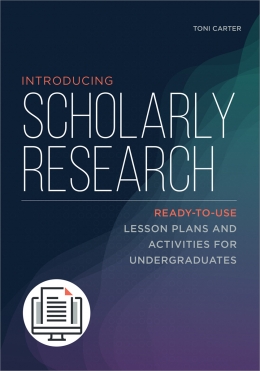Primary tabs
You don't need to be an ALA Member to purchase from the ALA Store, but you'll be asked to create an online account/profile during checkout to proceed. This Web Account is for both Members and non-Members. Note that your ALA Member discount will be applied at the final step of the checkout process.
If you are Tax-Exempt, please verify that your account is currently set up as exempt before placing your order, as our new fulfillment center will need current documentation. Learn how to verify here.
- Description
- Table of Contents
- About the author
- Reviews
From this book, instruction librarians will gain strategies and practical tools for introducing undergraduates to scholarly research topics such as research ethics, the role of research in higher education, quantitative and qualitative methods, and research in the areas of STEM, Humanities, and Social Sciences.
The world of scholarly research is uncharted territory for undergrads, but with the right approach you can quickly get them up to speed. With 33 time-saving lesson plans, Carter’s invaluable resource will assist you in moving your instruction beyond basic skills to include how to use a library database and the reasons scholars use them to explaining why peer review is important. Inside, you’ll find
- modular lessons designed for 50-minute timeslots that include individual and group activities with 25 worksheets, quick in-session assessment, conversation starters, and learning outcomes;
- a variety of mix-and-match tools and activities that can be easily adapted for one-shots;
- concepts that are grounded in the ACRL Framework;
- topics that include the infrastructure that supports the scholarly research process;
- warm-ups using the lingo of favorite hobbies to launch a discussion of scholarship terminology;
- an exercise that brainstorms the factors leading to authority, then asks students to apply them to a well-known campus professor;
- an activity using visualization to examine the characteristics of a scholar to check biases and explore diversity;
- factors to consider when choosing a scholarly journal for publishing research;
- QUAN and QUAL worksheets to teach the two type of research; and
- discussion on the categories, disciplines, and crossovers within liberal arts.
List of Worksheets
Preface
Acknowledgments
Introduction
Chapter 1 Process
- Lesson 1: Research Happens . . . But Why?
- Lesson 2: A Malleable (and Messy) Process
- Lesson 3: The Conversations of Scholars
- Lesson 4: Peer Review as the Gold Standard
- Lesson 5: Markers of Authority
- Lesson 6: Sharing the Results
Chapter 2 People
- Lesson 7: What Is a Scholar?
- Lesson 8: Paths to a PhD
- Lesson 9: Diversity among Scholars
- Lesson 10: Community-Granted Authority
- Lesson 11: Uses for Scholarly Profiles
- Lesson 12: Inclusivity and the Scholarly Conversation
- Conversation Starters
Chapter 3 Terminology
- Lesson 13: A Lexicon Exists
- Lesson 14: Stay Calm and Choose the Right Words
- Lesson 15: Scholarly: Exploring a Fundamental Term
- Lesson 16: Is It a Search or Is It Research?
Chapter 4 Methods of Inquiry
- Lesson 17: Scientific Method: One Size Fits All?
- Lesson 18: Research Design
- Lesson 19: The Two Qs of Research
- Conversation Starters
Chapter 5 Disciplines
- Lesson 20: Start with the Liberal Arts
- Lesson 21: Science Research: The Familiar
- Lesson 22: Social Science Research: The Less Familiar
- Lesson 23: Digital Humanities
- Conversation Starters
Chapter 6 Dissemination and Access
- Lesson 24: The Job of Scholarly Journals
- Lesson 25: Choosing Where to Publish
- Lesson 26: Subscriptions to Scholarly Research
- Lesson 27: Open Access
- Conversation Starters
Chapter 7 On Campus
- Lesson 28: The Research University
- Lesson 29: Show Me the Grant Money
- Lesson 30: Protecting Humans
- Lesson 31: The Value of the Library
- Lesson 32: Undergraduate Research
- Lesson 33: Publish or Perish
Bibliography
Index
Toni Carter
Toni Carter is Director of Kares Library at Athens State University in Athens, Alabama. The first 15 years of her career in academic librarianship focused on information literacy instruction, having served as both an instruction librarian and instruction coordinator. She has published peer-reviewed articles and has presented related topics at local, regional, and national conferences, including the ACRL, ALA, and LOEX.
"The activities in this book are ideally suited for librarians or other instructors in academic libraries who are developing and teaching a course on scholarly research. They could be adapted for a workshop series or for multi-session course-integrated instruction. The lessons can also be used as introductory or stand-alone activities in oneshots, and the author says each lesson can fit within a 50-minute session ... This book is recommended for librarians in academic libraries who regularly teach undergraduate students about scholarly research at any level and in all disciplines and would be particularly useful for librarians that teach credit-bearing information literacy courses. It could also be used by disciplinary faculty or graduate teaching assistants that teach research methods courses for undergraduate students."
— Technical Services Quarterly



